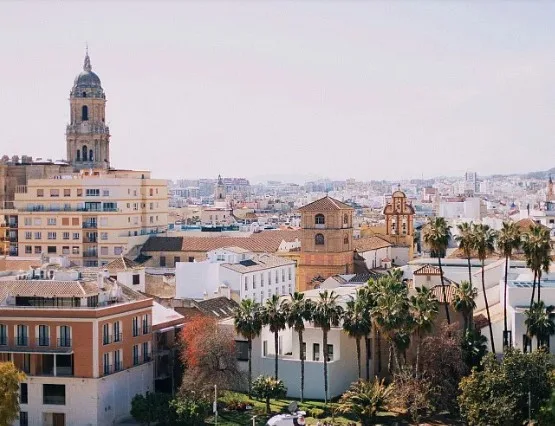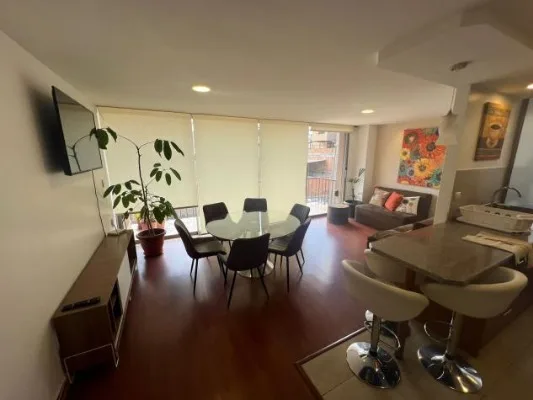Frustrated residents of popular European cities are telling tourists to go home
By Saskia O’Donoghue
Málaga locals are frustrated by the growing influx of tourists and now they’re expressing their feelings in no uncertain terms.
The Spanish city’s centre has been hit with a wave of stickers, posted on walls and doors, telling visitors what residents think of them.

Many residents of Malaga, Spain are saying, ‘tourists go home.’
Walk the streets of Málaga and you’ll see these daubs, ranging from the fairly mild “this used to be my home” (antes esta era mi casa) and “this used to be the city centre” (antes esto era el centro) all the way to “go f*cking home” (a tu puta casa), “stinking of tourist” (apestando a turista).
The city on the Costa del Sol has long been a popular destination for visitors, thanks to its sunny climate and relatively low cost of living. However, it’s recently become an even more desirable destination for holidaymakers and digital nomads alike.
Many locals have simply had enough. Bar owner Dani Drunko runs a much-frequented bar in Málaga called Drunkorama. He started the ‘sticker initiative’, having favourite anti-tourist phrases given to him by bar regulars printed and posted around the city.
Speaking to a local newspaper Diario Sur, Drunko explained that he began the campaign after he was apparently “kicked out” of the home he’d lived in for a decade.
He claimed that the landlord refused to negotiate the rent or even sell him the property. The reason? They wanted to turn it into a short-term rental for tourists.

Throughout Europe, popular tourist destinations are being overrun by foreign visitors.
“There’s a lot of hype because locals are tired of the situation; I just suggested the idea of the catchphrases, I offered the spark, and now others have joined,” Drunko told Diario Sur.
“Málaga city centre has been going downhill for a long time, so much so that if for example something in my bar breaks, I don’t have a hardware store on hand to buy anything, since the tourist who comes doesn’t need to buy screws,” he added.
Local politician Dani Pérez took to X – formerly Twitter – to add his voice to the growing discontentment.
“You walk the streets of Málaga and it is practically impossible to find a residential building that does not have a lockbox [for tourist rentals],” he wrote, going on to accuse the city’s mayor, Paco de la Torre, of “not lifting a finger for the people of Malaga” and “expelling them from the city where they were born.”
Last November, a local reporter for news website The Local Spain reported that Málaga is “definitely busier than before during low season,” while confirming the existence of lockboxes “everywhere” and commenting that restaurant prices have seen huge hikes in recent months.

Signs on Malaga streets, written in English, express local frustration at rising tourist numbers.
What makes Málaga so popular with foreign visitors?
Spain’s Costa del Sol, home to Málaga, has been hugely popular with tourists for years. In 2023, a record 14 million holidaymakers from Spain and abroad visited – and a fair few visitors decided to make the city their home.
Recent data from Spain’s National Statistics Institute (INE) shows that eight out of 10 new residents moving to Málaga are currently foreigners.
It’s not just individuals changing the face of the city, though. Some 630 tech companies, including Google, have opened offices in Málaga, turning it into a quasi-Silicon Valley of Europe.
That has the knock-on effect of drawing thousands of international remote workers and digital nomads, attracted by the heady combination of a pleasant work environment and warm climate.
Málaga locals, though, think enough is enough, believing they are being priced out and alienated from their own home city.
Which other European destinations have fought back against overtourism?
Earlier in March, the Canary Islands – a territory of Spain – saw graffiti pop up ordering tourists to “go home”.
With its year-round sun and warm weather, the Canaries are an always-popular destination for foreign visitors – and tourism is seen as the island group’s largest money maker.
One of the most popular islands, Tenerife, recently declared a water emergency. That added more fuel to the fire for locals, as some tourist areas there use up to six times more water than residential areas, putting pressure on reserves crucial for drinking water and farming.
In February, nearby Gran Canaria saw walls emblazoned with the message, ‘tourists and digital nomads go home’, something newspaper the Canarian Weekly reported as ‘tourismphobia’.
On the Balearic island Mallorca last August, residents put up fake signs along a number of beaches, reading: “beware of dangerous jellyfish” and “caution, falling rocks”.
All written in English, the signs also featured, in smaller print, explanations in Catalan informing locals that warnings are not real. Instead, the text read: “the problem isn’t a rockfall, it’s mass tourism” and “beach open except for foreigners (guiris) and jellyfish”.
Overtourism isn’t just a problem in Spanish territories, though.
Many European nations have been putting tourist taxes in place, including Venice which has also banned cruise ships from entering its endangered canal system.
In Amsterdam, authorities and locals alike have been trying for months to encourage – mostly British – drunken tourists to stay away and in Kyoto, Japan, roads have been sealed off to ensure the city doesn’t become a ‘theme park’.
Other top tourist destinations are begging people not to visit, with many simply not having the infrastructure to accommodate them.
Hawaii is on many people’s bucket lists, but continues to struggle with hospitality worker shortages, congested roads and 90-minute restaurant waiting times as tourists still arrive in droves.
While the problem does appear to be a global one, it is Spain that is leading the grassroots fight back.
________________
Credit: EuroNews





















